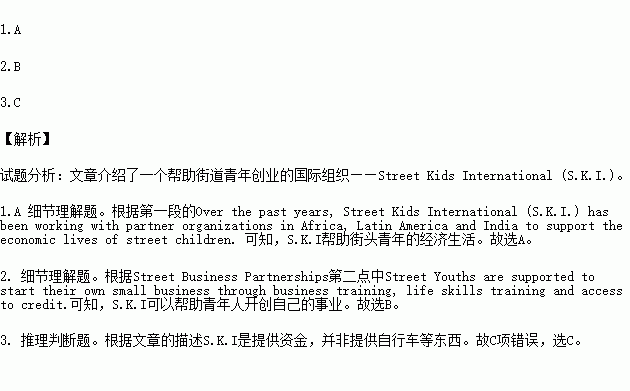题目内容
Micro-Enterprise Credit for Street Youth
Introduction
Although small-scale business training and credit programs have become more common throughout the world, relatively little attention has been paid to the need to direct such opportunities to youth living on the street or in difficult circumstances. Over the past years, Street Kids International (S.K.I.) has been working with partner organizations in Africa, Latin America and India to support the economic lives of street children. The purpose of this paper is to share some of the lessons S.K. I. and our partner organizations have learned.
Background
Typically, children end up on the streets not due to a single cause, but a combination of factors: the lack of adequately funded schools, the demand for income at home and so on. The street may be attractive to children as a place to find adventurous play and money. However, it is also a place where some children are exposed, with little or no protection, to exploitative employment, and urban crime.
Street Business Partnerships
S.K.I. has worked with partner organizations in Latin America, Africa and India to develop innovative opportunities for street children to earn income.
● The S.K.I Bicycle Courier Service first started in the Sudan. Participants in this enterprise were supplied with bicycles, which they used to deliver parcels and messages, but they were required to pay for it gradually from their wages.
● The Youth Skills Enterprise Initiative in Zambia is a joint program with the Red Cross Society. Street Youths are supported to start their own small business through business training, life skills training and access to credit.
Lessons Learned
The following lessons have emerged from the programs that S.K.I. and partner organizations have created.
● It’s important for all loans to be linked to training programs that include the development of basic business and life skills.
● Small loans are provided initially for purchasing fixed assets such as bicycles, shoe shining kits.
● All S.K.I. programs have charged interest on the loans, primarily to get the business runners used to the concept of paying interest on borrowing money. Generally the rates have been modest.
Conclusion
There is a need to recognize the importance of access to credit for poor young people seeking to fulfill economic needs.
1.The organization, S.K.I., aims to ________.
A. give business training and loans to street children
B. provide schools and social support for street children
C. share the lessons S.K. I. learned to help street children
D. draw the attention of the government to street children
2.This passage implies that with the help of S. K. I. street children may ________.
A. reject paid employmentB. set up their own business
C. leave their familiesD. employ other children
3.Which of the following is NOT true according to the passage?
A. The link of all loans to training programs is important.
B. Interest is charged for the loans in all S.K.I. programs.
C. The S.K.I Bicycle Courier Service provides the participants with free bicycles.
D. The Youth Skills Enterprise Initiative in Zambia works with another organization.
 轻松夺冠全能掌控卷系列答案
轻松夺冠全能掌控卷系列答案
